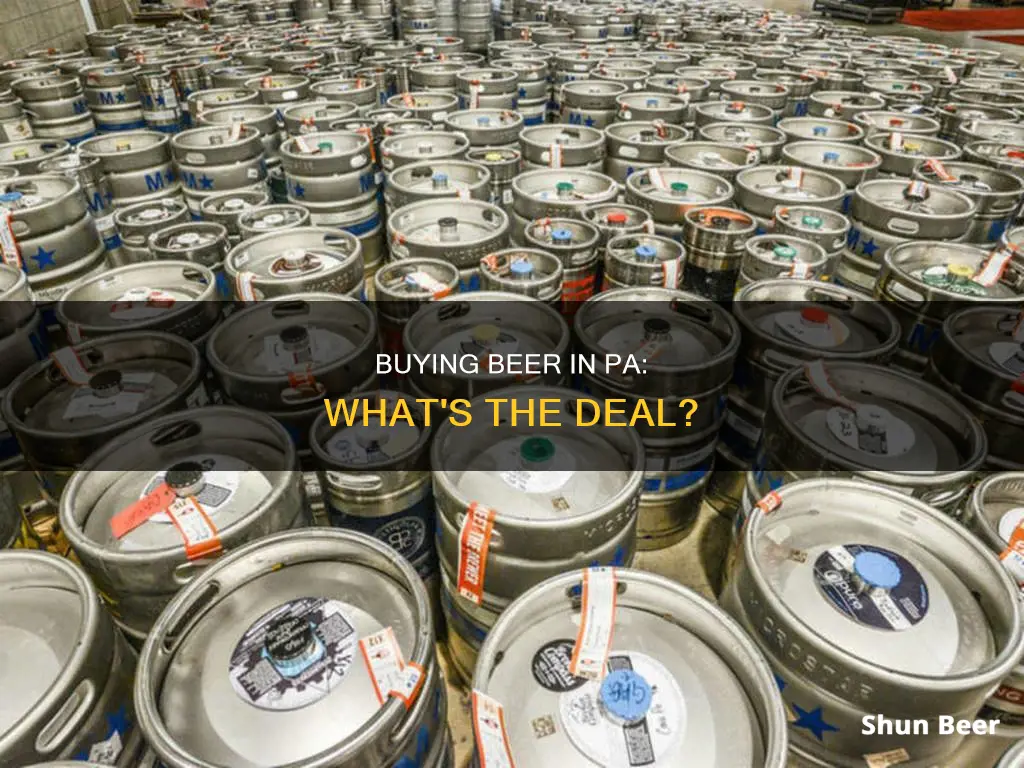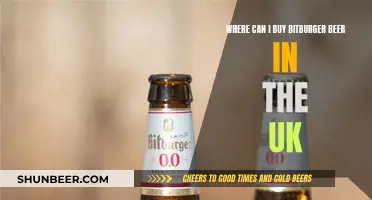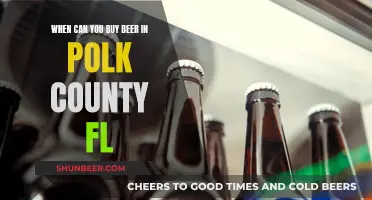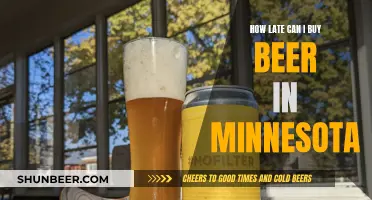
Pennsylvania's liquor laws are notoriously complex and restrictive, with a long history dating back to the Prohibition era. The state's unique regulations can be traced to Governor Gifford Pinchot, who, despite eventually accepting the repeal of Prohibition, maintained a tough stance on alcohol control. Pinchot's administration established the Pennsylvania Liquor Control Board, which licenses establishments, sets serving hours, and regulates prices. Over the years, Pennsylvania's liquor laws have loosened, but they remain strict compared to other states. So, can you still buy beer in PA? The short answer is yes, but it depends on where you go. Beer can be purchased from various outlets, including distributors, bottle shops, bars, grocery stores, and breweries, each with different restrictions on quantities and consumption rules.
| Characteristics | Values |
|---|---|
| Can you buy beer in PA? | Yes |
| Where can you buy beer? | Beer distributors, bottle shops, bars, grocery stores, and breweries |
| Can you buy liquor in PA? | Yes |
| Where can you buy liquor? | State-owned Fine Wine & Good Spirits stores |
| Can you buy wine in PA? | Yes |
| Where can you buy wine? | Supermarkets, wineries, and some grocery stores |
| Is there a limit on the amount of beer you can buy at a grocery store? | Yes, 192 fluid ounces of beer per purchase |
| Is there a limit on the amount of wine you can buy at a grocery store? | Yes, 3 liters of wine per purchase |
| Do you need to be accompanied by a parent or guardian to enter a liquor store in PA? | No, but you must be 21 or older |
| Can people under 21 enter most beverage distributors? | Yes, since most distributors also sell water, soda, ice, and some snack foods |
What You'll Learn

Where to buy beer in Pennsylvania
Pennsylvania's liquor laws are notoriously confusing, so it's not always easy to know where to buy beer. Here's a guide to help you navigate the state's unusual alcohol regulations.
Beer is probably the easiest alcoholic drink to get your hands on in Pennsylvania, as several places can sell it. These include beer distributors, bottle shops, bars, grocery stores, and breweries. However, the amount of beer they can sell you depends on the type of license they have.
Beer Distributors
Beer distributors have the fewest restrictions. They can sell you kegs, cases, 12-packs, six-packs, single bottles, and growlers. However, all beer purchased from a distributor must be for "off-premise consumption," meaning you can't drink it on-site.
Bottle Shops, Grocery and Convenience Stores, Bars, and Other Licensed Places
These places can obtain a license to sell up to 192 fluid ounces of beer (equivalent to 12 16-ounce cans) per transaction. You can buy more, but you'll need to make separate transactions. Beer purchased from these places can be consumed on-site or taken to go.
Breweries
Licensed breweries can sell you beer to drink on-site or take away. They can also sell products from other Pennsylvania-licensed producers for on-site consumption.
Online and Delivery Options
You can also have beer shipped or delivered to your home or business in Pennsylvania. Many breweries offer local delivery, or you can use services like GoPuff or Quick Sip Delivery. Out-of-state beer shipping services, such as Tavour, can send you up to 192 fluid ounces of beer per month.
A Brief History of Pennsylvania's Liquor Laws
Pennsylvania's complex and restrictive alcohol laws have their roots in the Prohibition era. Gifford Pinchot, the governor from 1923 to 1935, was a teetotaler who wanted to "discourage the purchase of alcoholic beverages." The Pennsylvania Liquor Control Board was established in 1933 to license establishments, control alcohol sales, and regulate prices. While the laws have loosened slightly in recent years, buying alcohol in Pennsylvania can still be a confusing and inconvenient experience.
Good Beer in Florida: Where to Buy?
You may want to see also

Beer quantity limits at grocery stores
Pennsylvania's liquor laws can be confusing, and the state's rules around buying beer are no exception. Here is a breakdown of the beer quantity limits at grocery stores in the state:
Grocery stores in Pennsylvania can sell beer, but they have quantity limits per transaction. These limits depend on the type of license the store has. Grocery stores typically have a restaurant license, which allows them to sell up to 192 fluid ounces of beer per transaction (equivalent to 12 16-ounce cans or two six-packs and a little left over). This limit is a combination of beer and wine, so you could buy two six-packs of beer and two bottles of wine, for example.
If you want to buy more than the limit, you will need to make multiple transactions. Most stores require you to take each purchase outside to your car before making another purchase, although some stores may have more relaxed policies.
Other Places to Buy Beer:
If you want to buy larger quantities of beer, you can go to a beer distributor, which has fewer restrictions. Distributors can sell beer in any amount and configuration, including kegs, cases, 12-packs, six-packs, and single bottles. However, beer purchased from a distributor is for "off-premise consumption," meaning you can't drink it at the store.
Additionally, some convenience store chains like Sheetz, Rutter's, and Wawa sell beer at select locations.
Reselling Beer: Legalities of Buying to Resell
You may want to see also

Beer distributors
One example of a beer distributor in Pennsylvania is LT Verrastro, Inc., which was founded in 1968 and serves the Greater Pocono Northeast region, including cities like Scranton, Wilkes-Barre, and Stroudsburg. They represent a range of craft brewers, importers, cider companies, and domestic brewers, offering diligent service and support to their customers.
Another notable beer distributor is Banko Beverage Co., which has been in operation since 1933 and is one of the oldest and largest beer wholesalers in the state. They distribute drinks throughout the Greater Lehigh Valley area, offering a diverse selection of local and international beers, hard ciders, and non-alcoholic options. Banko Beverage Co. prides itself on its commitment to the local community and its participation in various local events.
In recent years, Pennsylvania's laws regarding beer sales have undergone some changes. In 2016, Governor Tom Wolf signed Act 39, which allowed for wine sales in supermarkets, restaurants, and hotels, and also permitted additional alcohol licenses for retailers. However, the state's alcohol laws still have peculiarities not found in other states, and the process of purchasing beer, wine, and liquor in Pennsylvania can be confusing for consumers due to the varying restrictions and licensed establishments.
Beer in Central Park: Where to Buy and Enjoy
You may want to see also

Buying beer at a grocery store: age restrictions
Pennsylvania's liquor laws can be confusing, especially when it comes to buying beer at a grocery store. Here are the age restrictions and some other things to keep in mind:
Age Restrictions
To buy beer at a grocery store in Pennsylvania, you must be 21 or older and have a valid ID. This can be a driver's license, passport, or military ID. The ID will be scanned or checked by the cashier before the sale is finalised. If you appear to be under the age of 25, you may be asked to provide proof of age, so it is always a good idea to carry your ID with you when purchasing alcohol.
Where to Buy Beer in the Grocery Store
Most grocery stores have a designated area or counter for purchasing beer and other alcoholic beverages. Look for signs that say "beer cafe" or "alcohol checkout." Sometimes, there will be specific lanes at the front of the store that are marked for alcohol purchases. At some stores, you may also be able to purchase beer at a cash register within the alcohol section if there is an employee present.
Purchase Limits
There are limits to how much beer you can buy in a single transaction at a Pennsylvania grocery store. The limit is typically 192 fluid ounces of beer per transaction, which is equivalent to twelve 16-ounce cans or two six-packs and a little extra. Some stores may have slightly different interpretations of this rule, so it is always a good idea to check with the store staff.
Multiple Transactions
If you want to purchase more than the allowed limit, you will need to make multiple transactions. This usually involves taking the first purchase to your car and then returning to the store for another transaction. Some stores may be more lenient and only require you to step outside the designated alcohol zone within the store before making another purchase.
Other Restrictions
It is important to note that Pennsylvania's liquor laws do not allow for the sale of hard liquor in grocery stores. Hard liquor can only be purchased at state-owned liquor stores. Additionally, Pennsylvania's liquor laws can vary from county to county, with different rules for Sunday sales and operating hours.
Buying Beer in Friona, Texas: What's the Deal?
You may want to see also

Beer and wine at restaurants and bars
Pennsylvania's liquor laws can be confusing, and they are considered some of the strictest in the United States. The laws can be traced back to the Prohibition era and Governor Gifford Pinchot, who was a teetotaler. The state has a complex three-tier system for alcohol sales, with different rules for beer, wine, and liquor.
Where to Buy Beer and Wine
Beer and wine are widely available at licensed retailers, including restaurants, bars, and grocery stores. Many supermarkets have dedicated sections or cafes for beer and wine sales, with separate checkouts. The laws specify that a retail license allows for the on-premises sale and consumption of alcoholic beverages. However, there are different types of retail licenses:
- Retail liquor licenses: These licenses allow the sale of liquor, wine, malt, and brewed beverages for consumption on the premises.
- Retail dispenser licenses: These licenses are limited to the sale of brewed and malt beverages only.
Quantity Restrictions
There are also quantity restrictions for beer and wine sales. Retailers can sell up to 192 fluid ounces of beer (usually translated to six-packs and twelve-packs of beer) and up to 3 liters of wine (equivalent to four 750ml bottles or one box of wine) per transaction. If customers want to purchase more, they have to make multiple transactions or visits.
Age Restrictions
To purchase alcohol in Pennsylvania, customers must be at least 21 years old and provide a valid ID. The laws are strictly enforced, and retailers can face penalties for selling alcohol to minors.
COVID-19 Impact
During the COVID-19 pandemic, there were temporary closures of Pennsylvania Liquor Control Board (PLCB) stores and online sales. However, beer and wine remained available at supermarkets, convenience stores, and restaurants for take-out or delivery. The PLCB also provided special allowances for licensees, suspending certain requirements and deadlines during the pandemic.
Teen Beer Buying in Texas: What's the Law?
You may want to see also
Frequently asked questions
No. You must be 21 or older to buy beer in Pennsylvania.
You can buy beer from a variety of places, including beer distributors, bottle shops, bars, grocery stores, and breweries.
It depends on the type of license the vendor has. Beer distributors have the fewest restrictions and can sell kegs, cases, 12-packs, six-packs, single bottles, and growlers. Other vendors with a restaurant license can sell up to 192 fluid ounces of beer (e.g. 12 16-ounce cans) per transaction.







